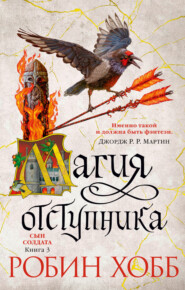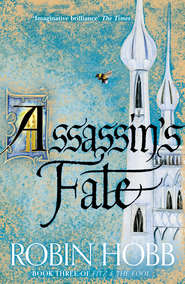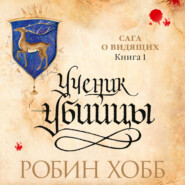По всем вопросам обращайтесь на: info@litportal.ru
(©) 2003-2024.
✖
Ship of Magic
Автор
Год написания книги
2019
Настройки чтения
Размер шрифта
Высота строк
Поля
‘Then how can you even bring such an offer here?’ she demanded hotly.
‘Because half of Bingtown knows how desperate things have become for you. Look here, woman. You haven’t the capital to hire the workers to farm those lands properly. Fullerjon does. And buying them would increase his land ownership to the point where he’d be qualified to petition for a seat on the Bingtown Council. Between the two of us, I think that’s all he’s really after anyway. It needn’t be your bottom lands, though that is what he’d like. Offer him something else; he’ll probably buy it from you.’ Davad leaned back with a dissatisfied look on his face. ‘Sell him the wheat fields. You can’t work them properly anyway.’
‘And he can gain a seat on the Bingtown Council. So he can vote to bring slaves to Bingtown. And work the lands I’ve sold him with slaves and sell the grain he grows cheaper than I can compete with. Or you, for that matter, or any other honest Trader. Davad Restart, use your mind. This offer not only asks me to betray the Vestrit family, but all of us. We’ve enough greedy little merchants on the Bingtown Council already. The Old Traders’ Council is barely able to keep them in check. I shan’t be the one to sell land and a council seat to another latecomer upstart.’
Davad started to speak, then visibly controlled himself. He folded his small hands on his lap. ‘It’s going to happen, Ronica.’ She heard true regret in his voice. ‘The day of the Old Traders is fading. The wars and the pirates bit into us too deeply. And now that the wars are mostly over, these merchants have come, swarming over us like fleas on a dying rabbit. They’ll suck us dry. We need their money in order to recover, so they force us to sell cheap what cost us so dear in blood and children.’ For a moment his voice faltered. Ronica suddenly recalled that the year of the Blood Plague had carried off all his children as well as left him a widower. He had never remarried.
‘It’s going to happen, Ronica,’ he repeated. ‘And those of us who survive will be the ones who have learned to adapt. When our families first settled Bingtown, they were poor and hungry and oh so adaptable. We’ve lost that. We’ve become what we fled. Fat and traditionalist and desperate to hang on to our monopolies. The only reason we despise the new merchants who have started moving in is that they remind us so much of ourselves. Or rather of our great-great-grandparents, and the tales we’ve heard of them.’
For a moment, Ronica almost felt inclined to agree with him. Then she felt a rush of anger. ‘They are nothing like the original Traders! They were wolves, these are eye-picking carrion birds! When the first Carrock set foot on this shore, he risked everything. He sold all he had for his ship-share, and mortgaged half of whatever he might gain for the next twenty years to the Satrap. And for what? For a grant of land and a guarantee of a share in the monopoly. What land? Why, whatever acreage he could claim. What monopoly? Why, on whatever goods he might discover that would be worth trading in. And where was this wonderful bargain granted to him? On a stretch of coast that for hundreds of years had been known as the Cursed Shores, a place where even the gods themselves did not claim dominion. And what did they find here? Diseases unknown before, strangeness that drove men mad overnight, and the doom that half our children are born not quite human.’
Davad suddenly went pale and made shushing motions with his hands. But Ronica was relentless.
‘Do you know what it does to a woman, Davad, to carry something inside her for nine months, not knowing if it’s the child and heir they’ve been praying for, or if it’s a malformed monster that her husband must strangle with his own hands? Or something in between? You must know what it does to a man. As I recall, your Dorill was pregnant three times yet you only had two children.’
‘And the Blood Plague carried them all off,’ Davad admitted brokenly. He suddenly lowered his face into his hands and Ronica was sorry, sorry for all she had said, and sorry for this pathetic shell of a man who had no wife to tell him to relace his tunic and scold the tailor for badly-fitting trousers. She was sorry for all of them, born in Bingtown to die in Bingtown, and in between to carry on the curse-plagued bargain their forebears had struck. Perhaps the worst part of that bargain was that one and all, they had come to love Bingtown and the surrounding green hills and valleys. Verdant as a jungle, soil black and rich in the hand, crystal water in the streams, and abundant game in the forests, it offered them wealth beyond the dreams of the sea-weary and draggled immigrants who had first been brave enough to anchor in the Bingtown harbour. In the end, the real contract had been made, not with the Satrap who nominally claimed these shores, but with the land itself. Beauty and fertility balanced with disease and death.
And something more, she admitted to herself. There was something in calling oneself a Bingtown Trader, in not only braving all the strangeness that came down the Rain River, but claiming it for one’s own. The first Traders had tried to establish their settlement at the mouth of the Rain River itself. They had built their homes on the river’s edge, using the roots of the stilt-trees as foundations for their cottages, and stringing bridges from home to home. The rising and falling river had rushed by beneath their floors and the wild storm winds had rocked their tree-houses at night. Sometimes the very earth itself would heave and tremble, and then the river might suddenly run milky white and deadly, for a day or a month. For two years the settlers had abided there, despite insects and fevers and the swift river that devoured anything that fell into it. Yet it had not been those hardships, but the strangeness that had finally driven them away. The little company of Traders had been pushed south by death and disease and the odd panics that might strike a woman as she kneaded the bread, the furies of self-destruction that could come on a man gathering wood and send him leaping into the river. Of three hundred and seven households that had been the original Traders, sixty-two families had survived that first three years. Even now, from Bingtown to the mouth of the Rain River there stretched a trail of abandoned townsites that marked the path of their attempts at settlement. Finally, here in Bingtown, on the shores of Trader Bay, they had found a tolerable distance from the Rain River and all that flowed down it. Of those families that had chosen to remain as settlers on the Rain River, the less said the better. The Rain Wild Traders were kin and a necessary part of all Bingtown was. She acknowledged that. Still.
‘Davad?’ She reached across Ephron to touch their old friend’s arm gently. ‘I’m sorry. I spoke too roughly, of things better left unmentioned.’
‘It’s all right,’ he lied into his hands. He lifted a pale face to meet her eyes. ‘What we Traders do not speak of amongst ourselves is common talk among these newcomers. Have not you noticed how few bring their wives and daughters with them? They do not come here to settle. They will buy land, yes, and sit on the Council and wring wealth out of Bingtown, but in between they will sail back to Jamaillia. That is where they will wed and keep their wives, where their children will be born, that is where they will go to spend their ageing years and send but a son or two here to manage things.’ He snorted disdainfully. ‘The Three-Ships Immigrants I could respect. They came here, and when we honestly told them what price this sanctuary would cost them, they still stayed. But this wave of newcomers arrive hoping only to reap the harvest we have watered with our blood.’
‘The Satrap is as much to blame as they are,’ Ronica agreed. ‘He has broken the word that was given to us by Esclepius, his forebear. It was sworn to us that he would make no more grants of land to newcomers, save that our Council approved it. The Three-Ships Immigrants came with empty hands, but willing backs, and they have become a part of us. But this latest wave come clutching land grants and claim their leffers with no regard for who or what it harms. Felco Treeves claimed his land on the hillsides above Trader Drur’s beer valley, and put cattle to graze on it. Now Drur’s springs that flowed so clear are yellow as cow’s piss, and his beer is scarcely drinkable. And when Trudo Fells came, he claimed as his own the forest where all had been free to cut firewood and oak for furniture, and…’
‘I know, I know it all,’ Davad cut in wearily. ‘Ronica, there is naught but bitterness in chewing these thoughts again. And there is no good in pretending that things will go back to how they once were. They will not. This is but the first wave of change. We can either ride over the wave, or be swamped by it. Don’t you think the Satrap will sell other grants of lands, once it is seen that these newcomers prosper? More will come. The only way to deal with them is to adapt to them. Learn from them, if we must – and take up their ways where we must.’
‘Aye.’ Ephron’s voice was like a rusted hinge breaking free. ‘We can learn to like slavery so well that we do not care when our grandchildren may become slaves because of a year’s debts mounting too high. And as for the sea serpents that the slave-ships lure into our waters, chumming them along with the bodies they throw overboard, well, we can welcome them right into Trader Bay and never need the bone-yard again.’
It was a long speech for a sick man. He stopped to breathe. At the first sign of his wakening, Ronica had arisen to fetch the poppy milk. She drew the stopper from the heavy brown bottle, but Ephron slowly shook his head. ‘Not yet,’ he told her. He breathed for a moment before he repeated, ‘Not just yet.’ He turned his weary gaze to Davad, whose tactless dismay at Ephron’s weakness was writ large on his face. Ephron gave a feeble cough.
Davad bent his face into an attempt at a smile. ‘It’s good to see you awake, Ephron. I hope our conversation didn’t disturb you.’
For a moment or two Ephron just stared at the man. Then, with the casual rudeness of the truly ill, he ignored him. His dull eyes focused on his wife. ‘Any word of the Vivacia?’ he asked. He asked the question as a starving man might ask for food.
Ronica shook her head reluctantly as she set the poppy milk down. ‘But she should not be much longer. We have had word from the monastery that Wintrow is on his way home to us.’ She offered these last words brightly, but Ephron only turned his head slowly against the pillow.
‘What will he do? Look solemn and beg an offering for his monastery before he leaves? I gave up on that boy when his mother sacrificed him to Sa.’ Ephron closed his eyes and breathed for a time. He did not open his eyes before he spoke again. ‘Damn that Kyle. He should have been back weeks ago… unless he’s taken her to the bottom, and Althea, too. I knew I should have put the ship in Brashen’s hands. Kyle’s a good enough captain, but it takes Trader blood to truly feel the ways of a liveship.’
Ronica felt the blush rise in her cheeks. It shamed her to have her husband speak so of their son-in-law in Davad’s presence. ‘Are you hungry, Ephron? Or thirsty?’ she asked to change the subject.
‘Neither.’ He coughed. ‘I’m dying. And I’d like my damned ship here so I can die on her decks and quicken her, so my whole damned life won’t have been for nothing. That’s not much to ask for, is it? That the dream that I was born to fulfil should be played out as I’ve always planned it?’ He took a ragged breath. ‘The poppy, Ronica. The poppy now.’
She measured the syrupy medicine into a spoon. She held it to Ephron’s mouth and he swallowed it without complaint. Afterwards he took a breath and motioned at his water jug. He drank from the cup in small sips, then lay back against his pillows with a wheezing sigh. Already the lines on his forehead were loosening, his mouth getting slacker. His eyes wandered to Davad, but it was not to him he spoke.
‘Don’t sell anything, my love. Bide your time as best you can. Let me but die on the decks of my ship, and I’ll see the Vivacia serves you well. She and I will cut the waves as no ship ever has before, swift and true. You’ll lack for nothing, Ronica. I promise you. Just stay your course, and all will go well.’
His voice was winding down, going deeper and slower on each word. She held her own breath as he took another gulp of air. ‘Hold your course,’ he repeated, but she did not think he spoke to her. Perhaps the poppy had already carried his dreaming mind back to the deck of his beloved ship.
She felt the hated tears rising and fought them back. They struggled against her determination, choking her until the pain in her throat almost stopped her breath. She gave a sideways glance at Davad. He hadn’t the courtesy to turn his stare away, but at least he had the grace to be uncomfortable. ‘His ship,’ she found herself saying bitterly. ‘Always his damned ship; that was all he ever cared about.’ She wondered why she would rather that Davad believed she cried over that instead of Ephron’s death. She sniffed, horribly loud, then gave in and found her handkerchief and wiped her eyes.
‘I should be going,’ Davad realized belatedly.
‘Must you?’ Ronica heard herself replying reflexively. She found the discipline appropriate to her position. ‘Thank you so much for dropping in. Let me at least walk you to the door,’ she added, before Davad could change his mind about leaving.
She rose and tugged a light cover over Ephron. He muttered something about the topsail. Davad took her arm as they left the sickroom, and she forced herself to tolerate that courtesy. She blinked as she left the dimness of the sickroom behind her. She had always been proud of her bright and airy home; now the clear sunlight that flooded in the generous windows seemed harsh and glaring. She averted her eyes from the atrium as they passed it. Once it had been her pride and joy; now, bereft of her attentions, it was a desolate wasteland of browning vines and sprawling, straggling plant life. She tried to promise herself that after Ephron had finished dying she’d have time to attend to it once again, but suddenly that thought seemed vile and traitorous, as if she were hoping her husband would soon die so that she could take care of her garden.
‘You are quiet,’ Davad observed bluntly. In truth, she had forgotten him despite his arm linked with hers.
Before she could formulate a polite apology, he added gruffly, ‘But as I recall, when Dorill died, there was really nothing left to talk about to anyone.’ He turned to her as they reached the great white door and surprised her by taking both her hands in his. ‘If there is anything I can do… and I truly mean anything… will you let me know?’
His hands were damp and sweaty, his breath smelled of his over-spiced lunch, but the worst part was the absolute sincerity in his eyes. She knew he was her friend, but at that moment all she could see was what she might become. When Dorill had been alive, Davad had been a powerful man in Bingtown, a sharp Trader, well-dressed and prosperous, hosting balls at his great house, flourishing not only in his businesses but socially. Now his great house was only a collection of dusty, ill-kempt rooms presided over by unsupervised and dishonest servants. Ronica knew that she and Ephron were one of the few couples that still included Davad when they issued invitations to balls or dinners. When Ephron was gone, would she be like Davad, a social left-over, a widow too old to court and too young to seat in a quiet corner? Her fear came out as a sudden bitterness.
‘Anything, Davad? Well, you could always pay off my debts, harvest my fields, and find a suitable husband for Althea.’ She heard her own words in a sort of horror and watched Davad’s eyes widen so far that they almost bulged at her. Abruptly she pulled her hands free of his moist clasp. ‘I’m sorry, Davad,’ she said sincerely. ‘I don’t know what possessed me to…’
‘Never mind,’ he interrupted her hastily. ‘You’re talking to the man who burned his wife’s portrait, simply so that I wouldn’t have to look at what I couldn’t see. At times like these, one says and does things that… never mind, Ronica. And I did, truly, mean anything. I’m your friend, and I’ll see what I can do to help you.’
He turned and hurried away from her, down a white stone walkway to where his saddle-horse waited. Ronica stood watching as he mounted the beast awkwardly. He lifted one hand in farewell and she waved in return. She watched him ride off down the drive. Then she lifted her eyes to look out over Bingtown. For the first time since Ephron had been taken ill, she truly looked at the town. It had changed. Her own home, like many of the old Trader homes, was on a gentle hill above the harbour basin. Through the trees below, she could catch glimpses of the cobbled streets and white stone buildings of Bingtown, and beyond them the blue of Trader Bay. She could not see the Great Market from here, but she trusted it bustled on with the same trust she gave to the rising of the sun. The broad paved streets of it echoed the gentle horseshoe curve of the bay. Open and airy was the Great Market, planned out as carefully as any nobleman’s estate. Clumps of trees shaded small gardens where tables and chairs beckoned the weary buyer to relax for a time before arising to go forth and purchase more. One hundred and twenty shops with tall windows and wide doors welcomed trade from near and far. On a sunny day like today, the brightly-dyed awnings would be spread over the walkways to lure strollers closer to the merchants’ doors with their shade.
Ronica smiled to herself. Her mother and grandmother had always told her, proudly, that Bingtown did not look like a city hacked out of a wilderness on this chill and remote coast, but like any proper city in the Satrap’s dominion. The streets were straight and clean, offal and slops relegated to the alleys and drains behind the shops. Even those areas were regularly cleaned. When one left the Great Market and strolled away from the Lesser Marts, the city still presented a polished and civilized face. The houses of white stone shone in the sunlight. Orange and lemon trees flavoured the air with their fragrance, even if they did grow in tubs and have to be taken in every winter. Bingtown was the gem of the Cursed Shores, the farthest jewel of the Satrap’s cities, but still one of the brightest. Or so Ronica had always been told.
She reflected in a moment’s bitterness that she would never know, now, if her mother and grandmother had spoken truly. Once, Ephron had promised her that some day they would make a pilgrimage to holy Jamaillia City, and visit Sa’s groves and see the gleaming palace of the Satrap himself. Another dream turned to dust. She pulled her mind away from such thoughts and gazed out again over Bingtown. All there looked as it always had; a few more ships anchored in the harbour, a few more folk hastening through the streets, but that was to be expected. Bingtown had been growing, just as it had been growing all her life.
It was when she lifted her eyes to gaze out over the surrounding hills that she realized how much things had changed. Hammersmith Hill, where the oaks had always stood tall and green now showed a bald pate. She gazed at it in a sort of awe. She had heard that one of the newcomers had claimed land there and was going to use slaves to log it. But never before had she seen a hill so completely stripped of forest. The heat of the day beat down mercilessly on the naked hill; what greenery remained looked scorched and sagging.
Hammersmith Hill was the most shocking change, but it was by no means the only one. To the east, someone had cleared space on a hillside and was building a house. No, Ronica corrected herself, a mansion. It was not just the size of the building that jolted her, but the number of workers employed in its construction. They swarmed over the building site like white-coated ants in the heat of the midday sun. Even as she watched, the timber framework for a wall was hoisted into place and secured. Off to the west, a new road cut an arrow-straight path into the hills. She could only glimpse segments of it through the trees, but it was wide and well-travelled. Uneasiness rose in her. Perhaps Davad had been more correct than she had suspected. Perhaps the changes that had come to Bingtown were more significant than a mere swelling of population. And if he were right about that, then he might also be correct in saying that the only way to survive this wave of New Traders would be to emulate them.
She turned away from Bingtown and her uncomfortable thoughts. She had no time to think of such things now. It was all she could do to live with her own disaster and fears. Bingtown would have to take care of itself.
4 DIVVYTOWN (#ulink_620773a8-c1dd-5543-8464-a5771dcf9bc8)
KENNIT MOISTENED HIS KERCHIEF in lemon oil and smoothed it over his beard and moustache. He regarded himself in the gilt-framed mirror over his washbasin. The oil gave an added sheen to his facial hair, but it was not that effect he had sought. The fragrance of the oil was still not sufficient to keep the stench of Divvytown from his nostrils. Coming to Divvytown was, he reflected, rather like being towed to dock in the musk and stench of a slave’s armpit.
He left his quarters and emerged onto the deck. The outside air was as sultry and humid as within, and the stink more powerful. He looked with distaste at the nearing shores of Divvytown. This pirate’s sanctuary had been well chosen. To find it, one not only had to know the way, but to be a consummate master of bringing a ship up an inland waterway. The limpid river that led to this lagoon looked no more promising than a dozen others that threaded their way through the multiple islands of the Shifting Shore to the true sea, but this one had a deep if narrow channel that a sailing ship could navigate, and a placid lagoon sheltered from even the wildest storms for anchorage. At one time, no doubt, it had been a beautiful place. Now mossy docks and piers poked out from every piece of firm land. The lush greenery that cloaked and overhung the river banks had been sheared back to bare mud. There was neither sufficient flow of water nor stirring of breeze to disperse the sewage and smoke of the clustering huts and hovels and stores of the pirate city. Eventually the rains of winter would come, to flush both city and lagoon briefly clean, but on a hot still summer day, the Divvytown lagoon harbour had all the beckoning charm of an unemptied chamber pot. To anchor here for more than a few days at a stretch invited moss and rot to the hull of a ship; to drink the water from all but a few wells gave a man the flux – and, if he were unlucky, the fever as well. Yet as Kennit stood looking down over the deck of his ship, he saw his crew working well and willingly. Even those in the boats towing the Marietta into harbour pulled away heartily, for to their noses this stench was the sweet smell of both home and pay. By tradition, their trove would be divvied out on deck as soon as the Marietta was tied up. In a few hours, they’d be up to their navels in whores and beer.
Aye, and before sun-up tomorrow, most of their hard-won loot would have passed into the hands of the soft innkeepers and whoremasters and merchants of Divvytown. Kennit shook his head pityingly and dabbed once more at his moustache with his lemon scented handkerchief. He permitted himself a small smile. At least this time, in addition to sowing their plunder throughout the town, his crew would spread the seeds of Kennit’s ambition. Before sun-up tomorrow, he’d wager that half of Divvytown would have heard the tale of Captain Kennit’s sooth-saying at the Others’ Island. He intended to be exceptionally generous with his men this day when it came to divvy-time. He would not flaunt it, but he’d take no more than a double crew-share this time. He wanted the pockets of his crew to be heavy with their pay; he wanted all Divvytown to remark and remember that the men of his ship seemed always to come to port with well-laden purses. Let them mark it up to the luck and largesse of their captain. Let them wonder if a bit of that luck and largesse might not benefit all of Divvytown in time.
The mate came to stand respectfully beside him as he leaned on the rail.
‘Sorcor, do you see that bluff there? A tower there would command a long view of the river, and a ballista or two beneath it could defend it from any ship that ever discovered our channel. Not only could Divvytown be warned well ahead of any attack, but it could defend itself. What do you think?’
Sorcor bit his lip but otherwise contained himself. Every time they put into port here, Kennit made this same proposal to him. Each time the seasoned mate answered the same. ‘Could there be found enough stone in this bog, a tower might be built, and rocks hauled up to throw. I suppose it might be done, sir. But who would pay for it, and who would oversee it? Divvytown would never stop quarrelling long enough to build and man such a defence.’
‘If Divvytown had a strong enough ruler, he could accomplish it. It would be only one of the many things he could accomplish.’
Sorcor glanced cautiously at his captain. This was new territory for their discussion. ‘Divvytown is a town of free men. We have no ruler.’
‘That is true,’ Kennit agreed. Experimentally, he added, ‘And that is why we are ruled instead by the greed of merchants and whoremasters. Look about you. We risk our lives for our gains, every sailor of us. Yet by the time we weigh anchor again, where will our gold be? Not in our own pockets. And what will a man have to show for it? Naught but an aching head, unless he has the ill luck to catch the crabs in a bagnio as well. The more a man has to spend in Divvytown, why then the more the beer or the bread or the women cost. But you are right. What Divvytown needs is not a ruler, but a leader. A man who can stir men to rule themselves, who can waken them so that they open their eyes and see what they could have.’ Kennit let his gaze move back out to the men who bowed their backs to the oars as the ship’s boats towed the Marietta into dock. Nothing in his relaxed stance could indicate to Sorcor that this was a carefully rehearsed speech. Kennit thought well of his first mate. He was not only a good seaman, but an intelligent man despite his limited education. If Kennit could sway him with his words, then perhaps others would begin to listen as well.

















